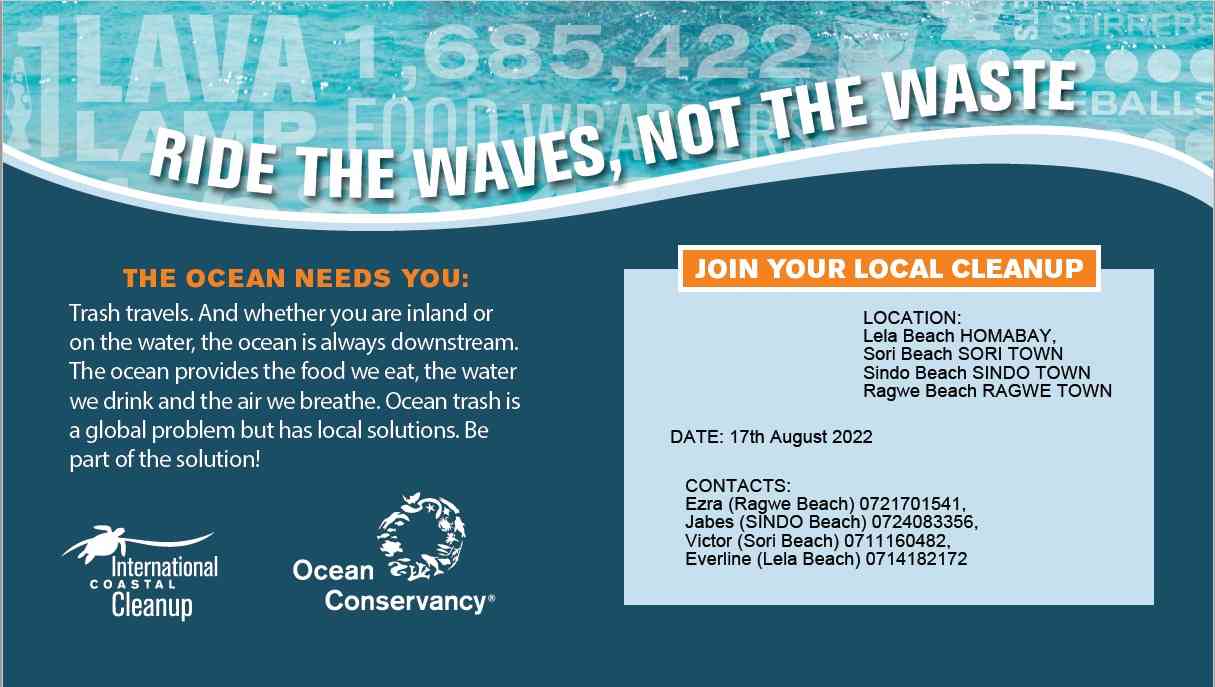2022 INTERNATIONAL COASTAL CLEANUP

BACKGROUND
International Coastal Cleanup Day on September 17 is a promise to bring cleanliness and purity to nature as a whole. The day was started as a way to raise awareness about the growing pollution on various beaches of the world. Population growth and capitalism are just two of the main factors that have led to severely high levels of pollution in the environment, particularly in the oceans that make up over 70% of our planet. Water has a cyclical nature, which means that anything we are putting into our oceans and other water bodies will come back to us sooner or later. For every mile of ocean, there are at least 46,000 pieces of plastic debris floating within said distance. Furthermore, as plastic does not decompose over a long period, and only disintegrates, minute plastic particles are already showing up in our food and water. If these trends continue, it won’t be long before we face disastrous outcomes for our environment
HISTORY
The International Coastal Cleanup Day came into existence more than 30 years ago. It was founded by Linda Maraniss and Kathy O’Hara, both of whom worked at the Ocean Conservancy, a nonprofit environmental agency that specializes in formulating resolutions and policies at federal and governmental levels. In 1986, Maraniss was inspired by O’Hara’s work and dedication towards cleaning up the ocean. The latter’s paper, which was due to be published next year, focused on plastic pollution in the ocean. Maraniss discussed her interest with O’Hara about starting a day to bring attention to the oceans’ growing pollution problem. They approached several environmental groups and activists with the idea, and in no time, the duo had enough support to start an official cleanup. The idea was simple: Go to a local beach with a garbage bag and start picking up trash in order to reduce the amount that would be swept into the ocean by water or wind.
Cleaning up the beaches wasn’t the only aim of the International Coastal Cleanup Day. Another important goal was to document and study the type of trash collected during the cleanup. Documentation included studying the trash’s material, where it could have come from, how long it would take to disintegrate, and what impact it would have on the ocean and the species living in it. Once everything is identified and documented thoroughly, the governments are informed about the findings. In order to prevent further damage, lobbying efforts are started at national and international levels. Industries also face policies that would stop them from either producing such items or dumping them into the oceans. Ever since its inception, the day has seen over 6 million cleanup volunteers in over 90 countries.
HOW TO OBSERVE INTERNATIONAL COASTAL CLEANUP DAY
Volunteer for a cleanup drive
This is the perfect day to go to your local beach and offer your time and services to clean it up. If no cleanup drives are happening around you, don’t worry. You can organize one yourself and get people to volunteer and help you with the cleanup.
Call out litterers
Keeping yourself and your environment neat and clean is one of the most basic hygiene practices we are taught as young children. Bring back the cleanliness lessons and implement them on yourself and those around you. Do not stand littering as eventually, it will come to harm you (and the litterers) in the long run one way or another.=
Reduce your plastic usage
Plastic started as a boon for many as it is durable and can be used to store a variety of things. But it is these very qualities of plastic that have turned it from a boon to a curse. The plastic toothbrush or spoon that you used 10 years ago and discarded, is still out there somewhere. It hasn’t decomposed and won’t be so for the next several hundred years. The best way to reduce plastic pollution is to reduce your own usage of the product by opting for bio-friendly options.
Major Milestones
1972: Ocean Conservancy is Created
Ocean Conservancy is created as a nonprofit organization working to help American coastlines from pollution.
1986: First International Coastal Cleanup Day
Linda Maraniss and Kathy O’Hara gather organizations and volunteers to organize the first International Coastal Cleanup Day.
2013: WSCSD-Kenya Becomes the official International Coordinator and Partner for Ocean Conservancy's ICC
WSCSD-Kenya, an affiliate of NEWA Family officially assumes the role of international coordinator for Ocean Conservancy's International Coastal Cleanup in East Africa
2020: The Ocean Decade
UNESCO announces the 2020s to be the official Ocean Decade in order to educate the world about the different ways they can take part in cleaning the oceans.
Related

SDI-Kenya Grant

WSCSD/SCL/PR/01-PROCUREMENT AND TENDERING POLICY

NEWA/W/002/2021: SOCIAL PROTECTION REQUEST FORM - NEWA FAMILY

NEWA Family CBO Internship Program

ADVERTISEMENT FOR VACANT POSITIONS
COMPANY PROFILE

CONSERVATION PROJECT PROPOSALS

Nyasare Community Strategic Action Plan

Community Needs Assessment
Nyasare Community Strategic Needs Assessment
